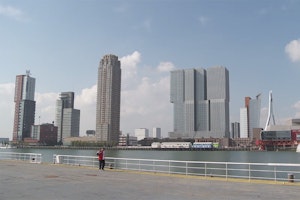Rotterdam’s Top Cop Wants to Strip Fashionable Young Black People
By Jair Schalkwijk & Dionne Abdoelhafiezkhan

Teenagers who buy clothes at bargain fashion outlets would do well to avoid showing off new purchases on the streets of Rotterdam this spring. The Dutch city’s police chief, Frank Paauw, has pledged to strip youngsters who don’t look like they can afford their clothes.
“We will undress them on the street!” said Paauw as he announced the bizarre initiative, which he believes will help tackle petty crime. Designer jackets will be the first to go. “An expensive coat is to them like a speedboat to a drug lord,” the chief added.
The plan was met with national and international skepticism, with critics pointing out that police run the risk of illegal racial profiling when deciding who to target based on appearance.
Police chief Paauw insists that officers will only stop and question people that are suspected of criminal activities. But his dog-whistle message has been widely shared on social media, appalling and alienating groups of migrant students and hard-working young people of migrant origin.
After all, it’s not unusually unkempt financiers from the Beurs World Trade Center that Paauw is talking about. It’s young people of migrant origin, who live in deprived neighborhoods of the largest harbor city in Europe. Large migrant families crammed into small social housing apartments often results in younger relatives spending time on the streets.
Remarks like Paauw’s do great damage. They undermine the very trust and cooperation that law enforcement’s community outreach initiatives are supposed to strengthen. They sever community relationships that provide the intelligence police rely on to solve crimes.
Police can’t hope to launch an effective program about building trust, respect, and diminishing racial profiling, while speaking with disrespect at the same time.
That’s a particular shame because Rotterdam police’s actions fly in the face of recent, more positive developments in the Netherlands. The relationship between the police and civilians of migrant origin has been publicly debated for five years now.
Recently, citizens—in cooperation with our organization Controle Alt Delete, Amnesty International, and many other NGOs—managed to build enough public pressure to force the police to make a change.

This has led to a new policy framework [link in Dutch], authored by the police with input by Controle Alt Delete. It condemns racial profiling in strong terms and explains to police officers that they’re not allowed to stop and question people because they belong to a group disproportionately represented in crime statistics.
It clarifies that citizens can’t be inspected solely because their “physical appearance does not match their cars” or that they don’t “belong in a certain area.” The new policy will be featured in the training course given to all Dutch police officers.
We did this with no special powers except for our pens, keyboards, and cameras. Controle Alt Delete trains young people to know their rights and help them file complaints against police, should they experience discrimination. We also produce and film situational tests that reveal racial profiling.
The more people support our work, the stronger we are as an organization. That’s why we mobilize people in the Netherlands to file complaints and write letters. But you can help us, too—build pressure on the Dutch police by watching and sharing the video above. Organizations in the Netherlands are highly susceptible to international criticism, and the police are no exception.
Controle Alt Delete is a grantee of the Open Society Foundations.
Jair Schalkwijk is a founder of Controle Alt Delete.
Dionne Abdoelhafiezkhan is a founder of Controle Alt Delete.

